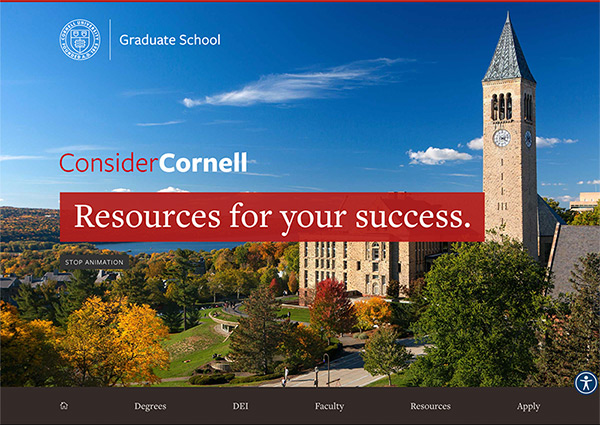Write a Personal Statement
Overview
There are two types of statements included in the Graduate School’s online application, (1) the Academic Statement of Purpose and (2) the Personal Statement, both of which are required for all graduate degree programs.
What Should the Personal Statement Include?
Your Personal Statement should provide the admissions committee with a sense of you as a whole person, and you should use it to describe how your personal background and experiences influenced your decision to pursue a graduate degree. Additionally, it should provide insights into your potential to contribute to Cornell University’s core value to provide a community of inclusion, belonging, and respect where scholars representing diverse backgrounds, perspectives, abilities, and experiences can learn and work productively and positively together. Within your Personal Statement, you may also share details on lessons learned from any of your lived experiences including but not limited to
- being a first-generation college student or graduate (no parent/guardian completed a baccalaureate degree)
- racial, ethnic, and/or cultural background(s)
- managing a disability or chronic health condition
- experiencing housing, food, economic, and/or other forms of significant insecurity
- being a solo parent
- gender identity and/or sexual orientation
- having served in the military
- holding DACA, refugee, TPS, or asylee status
Your Personal Statement provides you with an opportunity to share experiences that provide insights on how your personal, academic, and/or professional experiences demonstrate your ability to be both persistent and resilient, especially when navigating challenging circumstances. It also gives you an opportunity to provide examples of how you engage with others and have facilitated and/or participated in productive collaborative endeavors. Additionally, it is a place, where if necessary, you can (and should) address any blemishes, gaps, or weaknesses in your academic record. In these situations, you will want to be honest, but brief. It is best to turn negatives into positives by focusing on how you overcame obstacles, remained persistent in the pursuit of your goals, and showed resilience. Share what you learned from the particular experience, and how it led you to become a better researcher/scholar/person, etc.
Content in the Personal Statement should complement rather than duplicate the content contained within the Academic Statement of Purpose, which should focus explicitly on your academic interests, previous research and/or relevant professional experience, and intended area of academic focus during your graduate studies.

